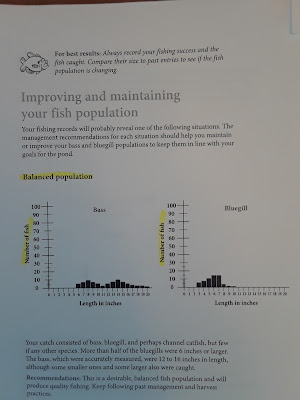Link: https://mdc.mo.gov/property/pond-stream-care
Pond 1: Too Many Green Sunfish
This small 1/4 acre pond has had different species of fish in it over the last 40 years, but currently it only has one resident. Well it sort of has one resident in the sense that it only has one aforementioned species residing in it; the green sunfish. It is so overrun with greenies that you can literally catch them on a bare hook. Some people have come over and used throw nets to catch the little suckers for bait. They reproduce about as fast as they get pulled out. My cousin stated that he wants it to be a crappie pond if possible.
Possible Solution: A Few Bass
Unfortunately for him, crappie are a bad choice in most Missouri ponds. In most cases, only a few survive to grow to a large size or more often, they overpopulate and stay small. According to the information that I found, there were two possible solutions. The first involved using a chemical called rotenone. This chemical blocks the absorption of oxygen by the fish without killing things like frogs, turtles, plant life, or birds. That's the good news. The bad news, you start from scratch with your pond which means lots of small fish for a while. Solution number two involved stocking 10-12 inch bass at a rate of 10-40 per acre. However, my thought was stocking some 15 inch bass that would total 12-15 in numbers. While the green sunfish problem might be around for a while longer, the bass will have plenty to eat and hopefully grow at a consistent and fast rate. Also, the site doesn't recommend transplanting fish from other bodies of water. However, there is another nearby pond that is full of 15 inch bass that are free of parasites and EXTREMELY aggressive. They have also stunted their growth in this pond so taking a few out might free up the others to start growing again.
Pond 2: Too Much Aquatic Vegetation & the Bass Won't Grow
This pond used to be a pretty clean pond with a nice balance of bass, catfish, and bluegill. This is pretty much the standard Missouri Pond configuration. However, after a lack of management for a few years, the catfish stunted their growth, the bluegill took over and the bass disappeared. In an effort to restore order and balance to the pond, some bass were transplanted from another pond. While the bluegill population is under control and the catfish and growing again, the bass are stunted now. Also, there is an abundance of aquatic vegetation that makes fishing difficult and frustrating at times. This pond used to have a grass carp but it died a few years ago.
Solutions:
First of all, I was absolutely shocked that a grass carp will eat 2-3 time its body weight per day! Wow! That should clean things up a little big if he stocks a few of these critters! So the plant problem might be solved, but what about the bass problem? In essence, the solution has already been eluded to; take some bass out. Bass growth will be stunted in a pond if there is over competition for food. Removing some bass will decrease competition for food and growth can start again. It is recommended that some fish annually be removed by anglers in order to maintain balance in the ecosystem. This will also create different ages and classes of fish as well, which is also healthy.
One More Thing
I snapped some pictures of parts of the Pond Management Handbook and thought I would share some parts that I found interesting as well as useful. I hope this helps if you know about a pond management problem.





















No comments:
Post a Comment